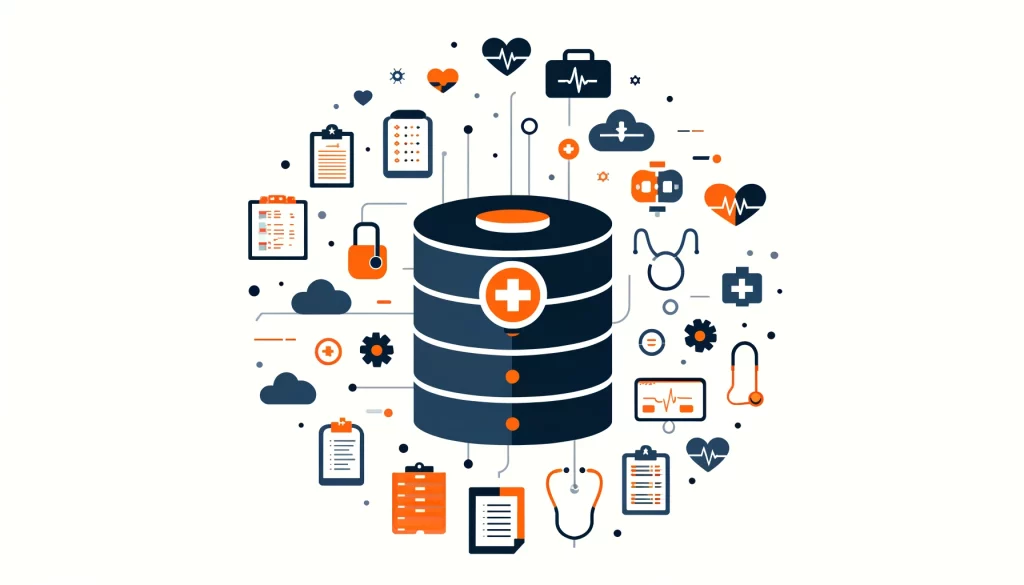
Clinical Data Repository

Clinical data repository is a database used by healthcare professionals to analyze and report patient information. These repositories serve as centralized platforms for accessing data. They are essentially data warehouses designed for healthcare purposes. This centralized platform helps in organizing and managing patient data efficiently.
Healthcare providers use data from various systems to understand a patient’s health history more effectively. This allows them to make more informed decisions and deliver care of higher quality.
Understanding the Structure of a Clinical Data Repository
Researchers build clinical data repositories to accommodate both structured and unstructured data. Structured data includes information such as lab results and patient demographics, which healthcare professionals can easily categorize and analyze.
Data that is unorganized, such as medical images from MRI scans, requires specialized storage and processing capabilities.
Clinical data repositories use a mix of data lake and data warehouse technologies. This helps them manage various types of data effectively. Data lakes and data warehouses are both used in these repositories. They can handle a wide range of data types.
Ensuring Compliance and Security in Clinical Data Management
Clinical data repositories must follow strict regulations like HIPAA and Hitrust because patient information is sensitive. These regulations ensure that patient data remains confidential and secure throughout its lifecycle.
Healthcare organizations must implement robust security measures and access controls to prevent unauthorized access and protect patient privacy. Failure to comply with these regulations can result in severe penalties and damage to reputation.
Optimizing Clinical Data Repository for Efficient Querying
One of the key challenges in managing clinical data repositories is handling concurrent queries from multiple applications and departments.
Different medical departments in a hospital may need various reports and analyses, which can slow down the database. Clinical data repositories must optimize for efficient querying and data retrieval to overcome this challenge.
This involves designing a well-structured database schema that allows for easy data access and redaction.
The Importance of Real-Time Insights in Clinical Decision-Making
Clinical data repositories should provide healthcare professionals with real-time insights into patient data.
These repositories combine information from different sources to provide a comprehensive overview of a patient’s health history. This allows medical professionals to make well-informed decisions promptly.
Having immediate access to medical information is important in departments like admitting and releasing patients. Healthcare providers greatly influence patient care and recovery by quickly accessing information.
Streamlining Workflows and Automating Processes
Clinical data repositories can also play a vital role in streamlining workflows and automating processes within healthcare organizations.
For example, image diagnostic departments can leverage clinical data to automatically schedule appointments based on referrals from other departments.
Similarly, pathology and laboratory departments can use clinical data repositories to efficiently process samples and match them with patient records.
By automating these processes, healthcare organizations can reduce manual errors, improve efficiency, and ultimately enhance patient care.
Enabling Medical Data Mining and Research
Beyond their immediate clinical applications, clinical data repositories serve as valuable resources for medical data mining and research.
Studying patient data can help researchers find new treatments and drugs. They do this by identifying patterns and connections between different diseases. This is possible when analyzing large amounts of data.
Clinical data mining also advances personalized medicine by tailoring treatments to an individual patient’s specific characteristics and health history.
Ensuring Data Quality and Integrity
To derive meaningful insights from clinical data repositories, healthcare organizations must prioritize data quality and integrity. Inaccurate or incomplete data can lead to flawed analyses and potentially harmful clinical decisions.
Implement regular data validation, cleansing, and updating processes to maintain the accuracy and reliability of clinical data. Additionally, establishing data governance policies and procedures can help ensure consistent data management practices across the organization.
Collaboration and Data Sharing in Clinical Research
Clinical data repositories not only benefit individual healthcare organizations but also contribute to the broader medical research community.
By enabling secure data sharing and collaboration between institutions, clinical data repositories can accelerate medical discoveries and advance patient care on a global scale.
Data sharing must follow privacy regulations and ethical guidelines. This is important to protect patient’s privacy and maintain trust in the healthcare system.
The Future of Clinical Data Repositories
As healthcare technologies continue to evolve, the role of clinical data repositories will become increasingly critical.
EHRs, wearable devices, and remote monitoring systems will generate a lot of patient data. You need to manage and analyze this data effectively.
Advancements in artificial intelligence and machine learning will enable more sophisticated analyses of clinical data, leading to predictive modeling and early disease detection.
Healthcare organizations need strong systems for storing information and analyzing data. This will help them use new technologies effectively. This will also allow them to improve patient care. Organizations with robust information systems can help patients get better.
Overcoming Challenges in Clinical Data Repository Implementation
Implementing and maintaining a clinical data repository is not without its challenges. One significant hurdle is the integration of data from disparate systems and formats.
Healthcare organizations use different software and devices that produce data in various formats. Integrating this data into a cohesive repository requires extensive data mapping, transformation, and efforts to standardize.
Another challenge is ensuring the scaling and performance of the clinical data repository as data volumes grow.
Healthcare organizations are gathering more patient data. The repository must be able to handle the increased storage and processing needs. You should do this without impacting query performance.
This may require regular hardware and software upgrades, as well as optimization of database indexes and query execution plans.
Conclusion
Clinical data repositories are essential tools for healthcare organizations seeking to improve patient care, streamline operations, and advance medical research.
These repositories gather patient data from various sources to offer a complete overview of a patient’s health history. This allows for immediate insights and well-informed decision-making.
However, managing clinical data repositories requires careful consideration of security, compliance, and data quality issues. As healthcare changes, using clinical data effectively will be important for new ideas and improvements in the field.
Healthcare organizations can use clinical data repositories to improve patient care, streamline workflows, and support important medical research.
